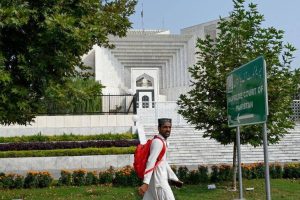PNN – Amendment No. 27 to the Constitution of Pakistan, while revising some of the powers of government institutions, has sparked a broad debate about the role of the military and the judiciary, as well as the future of political governance.
According to the report of Pakistan News Network, citing Al Jazeera, Pakistan is witnessing a sensitive political period after the parliament approved Amendment No. 27 to the Constitution. This amendment has sparked widespread controversy both inside and outside the country due to the unprecedented changes it creates in the structure of the military and judicial systems.
The most notable part of the new amendment is the granting of lifelong immunity to President Asif Ali Zardari, along with constitutional immunity for Army Commander Field Marshal Asim Munir, a move that many interpret as an attempt to create a legal umbrella for the ruling and military elite and protect them from any future legal prosecution.
Before this amendment, the title of field marshal was considered purely honorary, without any additional powers or privileges, but the proposed changes would enshrine the rank as a constitutionally recognized position.
This law was not limited to the president and the army commander, but also included the highest military leaders, who, according to this amendment, now enjoy complete immunity from criminal prosecution. The amendment gave five-star officers lifetime immunity, allowing them to “retain their rank and privileges and remain in uniform for life.”
Read more:
Global media reviews Pakistan’s constitutional defence reforms
Restructuring of military command
The restructuring of the military command, as enshrined in Amendment No. 27 to the Constitution, was described as “the most significant restructuring since the founding of the country.” This restructuring includes the following:
- Creating the position of Commander-in-Chief of the Defense Forces, with supreme executive powers.
- Establishing a National Strategic Command, responsible for managing the nuclear arsenal and strategic weapons.
- Adding the jurisdiction of the Air Force and Navy to the new General Command, which is implicitly considered subordinate to the Army Command?
- Abolition of the post of Chairman of the Joint Chiefs of Staff Committee.
- The proposed amendment also includes the creation of the position of Commander of the National Strategic Command, which would, among other things, be responsible for the country’s nuclear command.
- The commander of the National Strategic Command is appointed exclusively from the military and in consultation with the army commander, who, according to the amendment, also serves as the commander of the defense forces.
In Pakistani domestic circles, these developments have been interpreted as “consolidating the superiority of the ground military establishment” and giving it a central position in national defense management, at the expense of weakening the air and naval forces.

The new judiciary and the Constitutional Court
At the judicial level, this amendment makes fundamental changes, including:
- Establishing the Constitutional Court as an independent body exclusively responsible for reviewing constitutional cases.
- Reducing the powers of the Supreme Court, especially regarding oversight of the executive branch and the military.
- Parallel amendments to the secondary legislation related to the functioning of the courts.
- The Federal Constitutional Court will be governed by a special presidency and will consist of an equal number of judges from each of the four provinces of Pakistan, in addition to the federal capital, Islamabad.
- This court will hear disputes between the federal government and state governments or disputes between different state governments.
- The bill also empowers the president to transfer a judge from one high court to another on the recommendation of the Judicial Commission of Pakistan.
The Judicial Commission of Pakistan is the body responsible for recommending appointments to the highest judicial authority in Pakistan. Previously, the approval of the judge was required for the transfer, as well as consultation with the Chief Justice of Pakistan and the chief justices of the respective high courts.

Concerns about expanding military dominance
The constitutional amendment has plunged Pakistan into the heart of a heated political and legal controversy, amid internal disputes and growing international criticism.
From the moment this amendment was announced, human rights organizations and international reports warned that this amendment would pave the way for the military to consolidate its dominance over key government institutions and threaten the principle of separation of powers, which is the cornerstone of any democratic system.
A report by the news website Juras News described the amendment as a model of how “constitutional engineering” is being used to justify military control under the guise of democracy, warning that absolute immunity could strip the constitution of its role as a tool for accountability.
The creation of the Federal Constitutional Court sparked widespread controversy in Pakistani legal circles, with former judges and academics arguing that the move could weaken the Supreme Court and undermine the separation of powers.
Legal consultant Rima Omar warned that the executive branch would appoint judges who would then hold it accountable, potentially allowing the court to be used as a legal cover for decisions by higher authorities.
Justice Mansour Ali Shah, the second most senior judge of the Supreme Court, called the new court “a political tool to weaken the judiciary” and described the move as “a clear manipulation of the judicial process.”
The controversy intensified with the resignation of two prominent Supreme Court judges in protest against what they called the “complete seizure of judicial power” and “distortion of the constitution.”
The main opposition parties, including the Pakistan Tehreek-e-Insaf (PTI), boycotted the vote on the amendment, calling it a “weakening of the constitution.” Religious parties such as the Jamaat-e-Islami and the Jamiat Ulema-e-Islam also rejected it.

Government justifications
In the face of this flood of criticism, the coalition government led by Shahbaz Sharif emphasized that the amendment was not a threat to democracy, but rather a necessary step to modernize and improve the efficiency of government institutions, especially the army and the judiciary.
Senator Rana Sanaullah, a leader of the Pakistan Muslim League-Nawaz (PML-N) and political advisor to the prime minister, described the uproar as a “groundless storm”, while Defense Minister Khawaja Asif explained that the amendment to Article 243 was in line with “changing defense requirements”.
The government justified the creation of the Constitutional Court by citing a significant increase in the number of appeals to the Supreme Court and the resulting slowness in resolving civil and criminal cases.
Minister of State for Interior Talal Chaudhry strongly defended the right of parliament to amend the constitution, calling the resignations of judges politically motivated. He also acknowledged that Amendments 26 and 27 had helped to strengthen political stability. He did not rule out further amendments in the future in consultation with political forces.

Public and media disagreement
Pakistani public opinion on social media is divided into two groups: those who see this amendment as strengthening discipline and defense capabilities, and those who see it as a step towards institutionalizing military intervention in politics.
International newspapers described these reforms as a development that could change the system of government in Pakistan for decades. This comes as the Center for Democracy in South Asia warned that restructuring the judiciary in this way could weaken the institutions’ ability to hold political and military leaders accountable, especially given the extensive system of immunities.
While the government insists on its justifications for constitutional amendments and the opposition continues to express its opposition to them, Amendment No. 27 remains a significant milestone in Pakistan’s political journey. The proposed changes would restore some powers to government institutions and spark a broader debate about the role of the military and judiciary, as well as the future of political governance.
Amidst differing interpretations of this move, Pakistan finds itself facing a critical juncture in which the practical implementation of reforms will determine the shape of institutional balances and the direction of domestic politics in the years to come.

